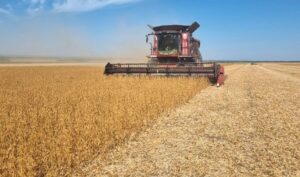
Agrotrade has completed threshing sunflower and soybeans in the fields of Poltava, Chernihiv, Kharkiv and Sumy regions, which covered 12.4 thou hectares and 8.1 thou hectares, respectively, the company’s press service reports.
According to the report, despite the abnormal heat during the 2024 season, the yield of sunflower and soybeans is quite high.
“We got high sunflower yields for these conditions in Chernihiv and Sumy regions. In Kharkiv region, it was much more difficult to work because there was no precipitation at all. In addition, this is a ‘conditionally safe’ area, so we were limited in our ability to conduct some agricultural operations. The yields depended on the cultivation technology: on the fields where we sowed with a long rotation and an optimal predecessor, they were high, and, conversely, with a short rotation and a poor predecessor, the yields were lower. At the same time, soybeans were affected by drought in all enterprises,” said Oleksandr Ovsyanyk, Director of Agrotrade’s Agricultural Department.
According to him, due to the hot summer, the grain arrives at the elevators completely dry and does not need to be processed. As a result, agricultural producers have significantly reduced drying costs, which improves the economic component of their work.
The agricultural holding has no plans to change its cultivation technology to take into account the drought. However, they intend to consider investing in moisture-saving technologies. Agrotrade Group is a vertically integrated holding company with a full agro-industrial cycle (production, processing, storage and trade of agricultural products). It cultivates over 70 thousand hectares of land in Chernihiv, Sumy, Poltava and Kharkiv regions.
Its main crops are sunflower, corn, winter wheat, soybeans and rapeseed. It has its own network of elevators with a simultaneous storage capacity of 570 thousand tons. The group also produces hybrid seeds of corn and sunflower, barley, and winter wheat. In 2014, a seed plant with a capacity of 20 thousand tons of seeds per year was built on the basis of Kolos seed farm (Kharkiv region). In 2018, Agrotrade launched its own brand Agroseeds on the market.
Vsevolod Kozhemiako is the founder and CEO of Agrotrade.
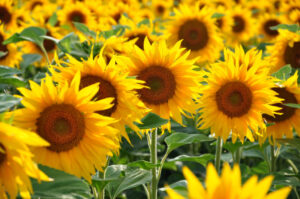
The deficit in the sunflower market in Ukraine continues to push prices up, due to the decrease in production of this oilseed compared to last year, Ukrainian plants are experiencing a shortage of raw materials, according to the analytical cooperative “Start”, created within the framework of the All-Ukrainian Agrarian Council (AAC).
“The price of sunflower has already exceeded 23 thousand UAH/t, and according to the seasonal model, the average price may reach 24 thousand-24.5 thousand UAH/t at the end of October. This is due to the large number of contracts for oil due to the shortage of raw materials,” the analysts said, adding that the crushing plants failed to accumulate stocks, as it was before.
According to the experts, most of the oil processing plants buy sunflower and immediately send it for processing. Previously, processors had stocks for October-November, but now many companies do not have enough to cover even the current month. This leads to higher prices and fierce competition between plants trying to buy the required amount of sunflower.
Pusk predicts that given the current trends and seasonality in the market, we can expect new record prices that may exceed the historical highs recorded in 2020.
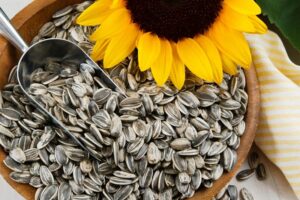
The agricultural holding Continental Farmers Group has completed threshing sunflower from 13 thousand hectares with a yield higher than planned and oil content of more than 50%, the press service of the agricultural holding reports.
“Although high temperatures during the flowering period somewhat reduced the expected potential of the crop in some regions, Continental still notes good quality of the harvested sunflower, its high oil content of more than 50% and yields above the target,” the statement said.
Currently, the agroholding has focused all its efforts on threshing soybeans, for which 46.5 thou hectares were allocated in the 2024 season. Both own and hired machinery are used to harvest the crop.
“We have started threshing corn only on a few areas where the moisture content is already at the basic level. This accelerated maturation of the crop was caused by a hot and dry August. However, we plan to start intensive corn harvesting in the second half of October in most fields. In total, we have 28.5 thou hectares of the crop to thresh,” explained Konstantin Shityuk, COO of Continental.
He noted that October will be the busiest period of the harvesting campaign for the agricultural holding. Weather conditions at the beginning of the month will largely determine whether the harvest season will be successful. Continental expects to complete the main field work on schedule and remains optimistic about crop yields.
The harvesting of sugar beet and potatoes continues on Continental’s fields, which this season occupy 3.2 thousand hectares and 1.8 thousand hectares respectively. For both crops, farmers are getting good intermediate results, with favorable weather conditions providing sufficient soil moisture for high-quality harvesting with minimal damage.
Mriya Agroholding and CFG, united under the name Continental Farmers Group, have been operating as a single business since November 2018, when Mriya entered into an agreement with international investor Salic UK to sell its assets.
Salic was founded in 2012. Its sole shareholder is the Saudi Arabian Public Investment Fund, which invests in agricultural and livestock production.
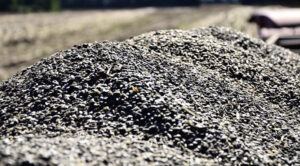
IMC Agro Holding has completed sunflower harvesting on 24.3 thou hectares, yielding 77.7 thou tons of gross harvest with a yield 60% higher than the national average of 3.2 t/ha, the company’s press service reported on its Facebook page.
According to the report, IMC also sowed winter wheat on an area of 20.7 thousand hectares.
“This year, September was abnormally dry and hot, so we managed to complete all field work in a short time. As a result, despite the hot and dry summer, we harvested a good sunflower crop with high quality indicators. As for the winter crops sown at the optimum time, we expect productive precipitation to sprout,” said Bogdan Krivitsky, Chief Operating Officer of the agricultural holding.
“IMC is an integrated group of companies operating in Sumy, Poltava and Chernihiv regions (north and center of Ukraine) in the crop production, elevators and warehouses segments. The company’s land bank is about 120 thousand hectares and storage capacity is 554 thousand tons, with a harvest of 1.002 million tons in 2023.
In the first half of 2023, IMC earned $6.28 million in net profit, down 44.6% year-on-year, while its revenue increased by 61.6% to $71.95 million, including a 41.2% increase in exports to $58.9 million. Normalized EBITDA amounted to $17.06 million, down 41% compared to the first half of 2022, due to higher selling costs and lower harvest prices.

The harvest of corn, according to preliminary estimates of the Ministry of Agrarian Policy and Food, in 2024 will be 25 million tons, sunflower – 12 million tons, soybeans – 5 million tons, said Minister of Agrarian Policy and Food Vitaly Koval in an interview with Forbes Ukraina.
“Ukraine did not receive about 2% of early grains compared to last year’s harvest. This group did not suffer as much as late crops. Soybeans, buckwheat, corn and sunflower suffered the most. They have a shortfall of about 10-15% depending on the region. However, this is not critical for the food security of the country,” he said.
Koval expressed confidence that in the new season the structure of crops will not change globally compared to last year. At the same time, the Ministry of Agrarian Policy has concerns about winter rape: there is not enough moisture to sow it.
“In total, about 5 million hectares of winter crops will be sown,” summarized the Minister of Agrarian Policy.
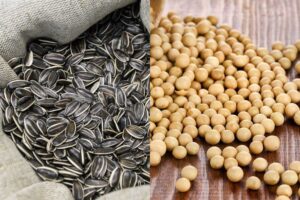
The farms of Ukrprominvest-Agro, one of the leading sugar producers in Ukraine, are actively harvesting late crops: 55% of soybean and 48% of corn have been harvested at PJSC Food Company Podillya, and 86% of sunflower and 30% of soybean at Food Company Zorya Podillya, the company’s press service reports on its Facebook page.
“The 2024 season was dry and hot, which led to premature drying and ripening of crops. Therefore, compared to previous years, we decided to start harvesting earlier,” said Yevhen Moskalev, Director of Ukrprominvest-Agro’s Agricultural Production Department.
According to him, this strategy applies to all crops except sugar beet, which has been postponed in anticipation of productive rainfall that will help soften the dry and hard soil for high-quality harvesting with less losses and less load on the harvesters.
The agroholding noted that Podillya has fully harvested its sunflower crop. The company also harvested soybeans on 55% of the area and corn on 48% of the area. On September 17, the sugar beet digging season started.
Zorya Podillya started harvesting early soybeans, followed by sunflower. As of mid-September, 86% of the sunflower area was harvested, 30% of soybeans were harvested, and corn harvesting has begun. Also, on September 10, the company started digging sugar beet in the area of its operations.
The sowing of winter crops for the 2025 harvest began in August-September: 5.7 thousand hectares of rapeseed and 655 hectares of winter rye have already been sown for green fodder for livestock, and winter wheat sowing has begun.
As reported, in 2024, UPI-Agro allocated 72.9 thou hectares for spring crops, including 22.3 thou hectares for sugar beet, 22.7 thou hectares for soybeans, 25.2 thou hectares for corn, and 2.7 thou hectares for sunflower.
“Ukrprominvest-Agro is engaged in growing crops, producing sugar, flour, meat and dairy farming.
The group’s land bank exceeds 116.5 thousand hectares. The agricultural holding is located mainly in regions that have not been invaded by the Russian occupiers.
The total number of cattle of the agricultural holding is 6.3 thousand, pigs – 12 thousand. The total elevator storage capacity of the agricultural holding is 120 thousand tons. The group’s sugar business is represented by two sugar factories in Vinnytsia region. In 2021, the group produced 263.4 thousand tons of sugar, the third highest in Ukraine. The holding supplies grain processing products to Moldova, Georgia, Turkmenistan, Israel, Palestine, Angola, Lebanon, Syria, and Vietnam.
Ukrprominvest-Agro comprises Agroprodinvest Group LLC, PJSC Podillya Production Complex, LLC Zorya Podillya Production Complex, LLC Vinnytsia Bakery No. 2, AF Dniproagrolan, AF Ivankivtsi, LLC Mas-Agro, LLC Pravoberezhne, and LLC Progress-NT.
The owner of the agricultural holding since December 2019 is the son of the former President of Ukraine Oleksiy Poroshenko.